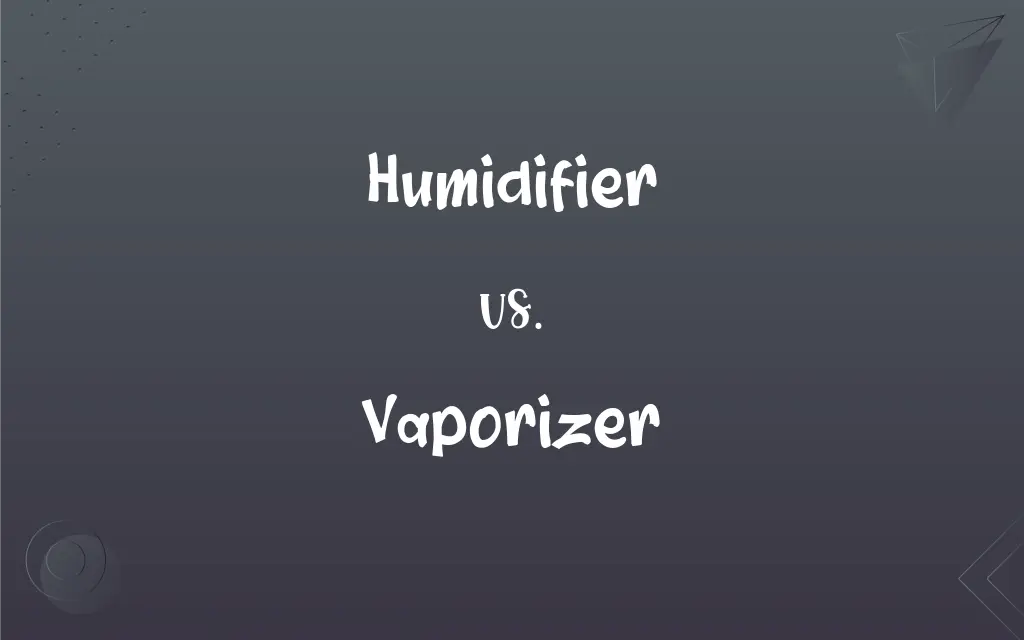Humidifier vs. Vaporizer: What's the Difference?
Edited by Aimie Carlson || By Harlon Moss || Updated on October 24, 2023
A humidifier adds moisture to the air, while a vaporizer heats water to produce steam.

Key Differences
A humidifier is a device designed to increase humidity levels in an environment by emitting water vapor. In contrast, a vaporizer is primarily used to boil water, converting it into steam, which is then cooled slightly before being released into the air.
Humidifiers are commonly used in dry climates or during winter months when indoor heating can decrease indoor humidity. Vaporizers, on the other hand, are often employed for medicinal purposes, as the steam they produce can be inhaled to alleviate congestion or other respiratory symptoms.
There are different types of humidifiers: ultrasonic, central, and evaporative, among others. Vaporizers, though fewer in variety, are commonly found in warm steam and cool mist formats.
One notable difference between the two is the temperature of the moisture they release. While a humidifier emits cool or room-temperature mist, a vaporizer releases warm or hot steam.
Safety considerations also differentiate them. Humidifiers tend to be safer, especially around children, as they don’t boil water. Vaporizers, because they heat water to produce steam, pose a burn risk if not handled properly.
ADVERTISEMENT
Comparison Chart
Function
Increases humidity by releasing water vapor.
Boils water to produce and release steam.
Common Uses
Counteracts dry air in homes or offices.
Medicinal use to alleviate respiratory symptoms.
Temperature of Emission
Typically cool or room-temperature mist.
Warm or hot steam.
Safety
Generally safe; doesn't boil water.
Can pose burn risks due to the hot water.
Types
Ultrasonic, central, evaporative, etc.
Warm steam and cool mist vaporizers.
ADVERTISEMENT
Humidifier and Vaporizer Definitions
Humidifier
A humidifier is a device that emits water vapor to increase humidity.
I bought a humidifier to combat the dry winter air in my apartment.
Vaporizer
Vaporizers can be used with medicated inhalants for therapeutic effects.
Adding eucalyptus oil to the vaporizer provided extra relief for my cold.
Humidifier
A humidifier can be standalone or integrated into HVAC systems.
The central humidifier in our home ensures uniform moisture throughout.
Vaporizer
A vaporizer is a device that produces steam by boiling water.
I use a vaporizer when I have a cold to help clear congestion.
Humidifier
A humidifier helps maintain optimal moisture levels in a space.
The plants thrived better after placing a humidifier in the greenhouse.
Vaporizer
Vaporizers, due to their heating element, need careful handling.
Keep the vaporizer out of reach of children to avoid accidental burns.
Humidifier
Humidifiers use water reservoirs to release vapor into the environment.
Ensure the humidifier's water tank is regularly cleaned to prevent mold growth.
Vaporizer
Vaporizers emit a warm mist to increase moisture levels.
The warm mist from the vaporizer made the room feel more comfortable.
Humidifier
A humidifier mitigates issues caused by dry air, like dry skin or respiratory problems.
After using the humidifier, I noticed a significant decrease in my morning allergies.
Vaporizer
Vaporizers can be therapeutic, aiding in respiratory relief.
My doctor recommended a vaporizer for my bronchitis symptoms.
Humidifier
A device for increasing the humidity in a room, greenhouse, or other enclosure.
Vaporizer
A device used to produce vapor from a substance.
Humidifier
A device that is used to increase the humidity of the air.
Vaporizer
A device with a heating element, used to vaporize a liquid.
Vaporizers are used in electronic cigarettes to simulate smoke.
Humidifier
A device that increases the moisture content of the air; - used to avoid excessive dryness in buildings, which can cause irritation to the throat. Compare dehumidifier.
Vaporizer
(medicine) A device with a heating element, used to vaporize a liquid solution with medicine. The produced vapor condensates into fine aerosols, forming a mist inside the device, to be inhaled by the patient for delivery of the medicine into the lungs.
Vaporizer
One who, or that which, vaporizes, or converts into vapor.
FAQs
Is a vaporizer beneficial for respiratory ailments?
Yes, vaporizers can aid in relieving congestion and other respiratory symptoms.
What does a vaporizer do?
A vaporizer boils water to produce and release steam.
Can a humidifier help with dry skin?
Yes, a humidifier can alleviate dry skin caused by dry air.
Do all humidifiers release cool mist?
No, while many release cool mist, some models emit warm mist.
Is a vaporizer safe to use around children?
Vaporizers can pose a burn risk, so they should be used cautiously around children.
Is there a difference in cost between humidifiers and vaporizers?
Costs can vary widely based on features and brands, but in general, both have affordable options.
What is the primary purpose of a humidifier?
A humidifier increases humidity levels by emitting water vapor.
Which is better for increasing room humidity: a humidifier or a vaporizer?
Both can increase room humidity, but the choice depends on the specific needs and preferences.
Why does a vaporizer release warm steam?
A vaporizer boils water, and the resulting steam is then cooled slightly before being released.
Which requires more maintenance: a humidifier or a vaporizer?
Both require regular cleaning, but the specific maintenance can vary by model.
Can a vaporizer help with allergies?
Yes, the warm steam from a vaporizer can help relieve allergy symptoms.
Can I use medicated products with a vaporizer?
Some vaporizers are designed for medicated inhalants, but always check the manufacturer's guidelines.
Do humidifiers consume a lot of energy?
Energy consumption varies by model, but in general, they are not significant energy consumers.
Which is more portable: a humidifier or a vaporizer?
Both come in portable models, but some humidifiers might be more compact and lightweight.
Can I add essential oils to my humidifier?
Not all humidifiers are designed for essential oils; check the manufacturer's guidelines.
Can I use tap water in my humidifier?
It's often recommended to use distilled or purified water to prevent mineral buildup.
Is it true that vaporizers can spread germs?
If not cleaned regularly, both humidifiers and vaporizers can spread germs.
Which is quieter: a humidifier or a vaporizer?
Ultrasonic humidifiers tend to be quieter, while some vaporizers can produce a boiling sound.
How often should I clean my vaporizer?
Regular cleaning, at least once a week or per use, is recommended to prevent germ buildup.
Are there risks associated with over-humidifying a room?
Yes, too much humidity can lead to mold growth and other issues.
About Author
Written by
Harlon MossHarlon is a seasoned quality moderator and accomplished content writer for Difference Wiki. An alumnus of the prestigious University of California, he earned his degree in Computer Science. Leveraging his academic background, Harlon brings a meticulous and informed perspective to his work, ensuring content accuracy and excellence.
Edited by
Aimie CarlsonAimie Carlson, holding a master's degree in English literature, is a fervent English language enthusiast. She lends her writing talents to Difference Wiki, a prominent website that specializes in comparisons, offering readers insightful analyses that both captivate and inform.































































